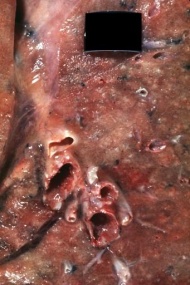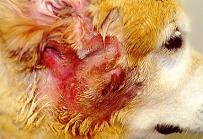How to Treat Bronchopneumonia
posted by: Gretchen
 Bronchopneumonia is the acute inflammation of the walls of the bronchioles. It is characterized by multiple foci of isolated, acute consolidation (the air space in the lungs is replaced with fluids), affecting one or more pulmonary lobules as defined by Wikipedia. This should not be confused with lobar pneumonia in which an entire section of the lung may be inflamed. Another type is called interstitial pneumonia which is used for inflammation and accumulation of fluid in the tissue between two alveoli.
Bronchopneumonia is the acute inflammation of the walls of the bronchioles. It is characterized by multiple foci of isolated, acute consolidation (the air space in the lungs is replaced with fluids), affecting one or more pulmonary lobules as defined by Wikipedia. This should not be confused with lobar pneumonia in which an entire section of the lung may be inflamed. Another type is called interstitial pneumonia which is used for inflammation and accumulation of fluid in the tissue between two alveoli.
What Causes Bronchopneumonia?
It is closely associated with hospital-acquired pneumonia. Some patients are not able to clear the lungs of medication,, physical weakness, or old age and this could act as one of the predisposing factors to the occurrence of this condition. The organisms responsible for this condition are staphylococci, streptococci, coliform bacteria, haemophilus influenzaea, and pseudomonas aeruginosa. Among children, this may occur as a result of complication following some illnesses like whooping cough, diphtheria, or measles. Among adults, this may result as a complication in paratyphoid fever, typhoid, and influenza. This condition could also be a complication of asthma. Inmost cases, it results from aspiration of organisms from the mouth.
What Are its Symptoms?
The symptoms of this condition include fever, coughing, chest congestion and pain, shallow breathing, fatigue, chills, and difficulty in breathing and coughing out blood-streaked mucus. The severity of the condition depends on the type of bacteria or infection causing the illness, as well as the general health of the patient.
What Could be the Complications that may Occur?
Some complications that could occur in cases of this condition include the following:
- Pulmonary fibrosis
- Empuema
- Lung abscess
- Bronchietasis
What Could be Done to Treat Bronchopneumonia?
Treatment of this condition includes the following:
- Antibiotics. Upon diagnosis, most patients will be treated at home with antibiotics.
- If the patient is suffering from dehydration or has a severe case, the patient may be treated in the hospital.
What Could be Done to Prevent this Condition?
Some vaccines available that can help prevent the bacteria and illnesses that can cause this condition. Some of them include Pneumococcal vaccine; flu vaccine; and Hib vaccine.
For more health tips, you can visit the website of emedicine and learn more about illnesses like tuberculosis, bronchitis, and others.
You might also like
|
|
|
|
|




